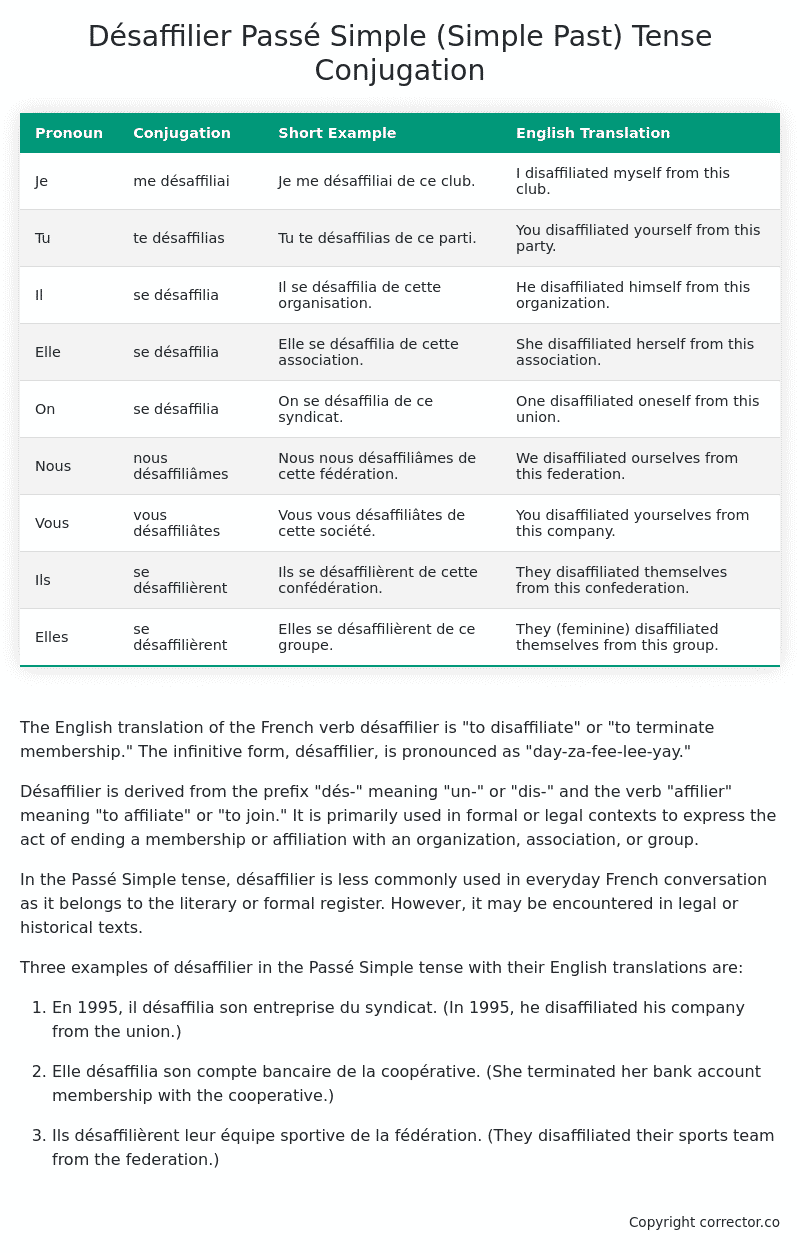Passé Simple (Simple Past) Tense Conjugation of the French Verb désaffilier
Introduction to the verb désaffilier
The English translation of the French verb désaffilier is “to disaffiliate” or “to terminate membership.” The infinitive form, désaffilier, is pronounced as “day-za-fee-lee-yay.”
Désaffilier is derived from the prefix “dés-” meaning “un-” or “dis-” and the verb “affilier” meaning “to affiliate” or “to join.” It is primarily used in formal or legal contexts to express the act of ending a membership or affiliation with an organization, association, or group.
In the Passé Simple tense, désaffilier is less commonly used in everyday French conversation as it belongs to the literary or formal register. However, it may be encountered in legal or historical texts.
Three examples of désaffilier in the Passé Simple tense with their English translations are:
-
En 1995, il désaffilia son entreprise du syndicat.
(In 1995, he disaffiliated his company from the union.) -
Elle désaffilia son compte bancaire de la coopérative.
(She terminated her bank account membership with the cooperative.) -
Ils désaffilièrent leur équipe sportive de la fédération.
(They disaffiliated their sports team from the federation.)
Table of the Passé Simple (Simple Past) Tense Conjugation of désaffilier
| Pronoun | Conjugation | Short Example | English Translation |
|---|---|---|---|
| Je | me désaffiliai | Je me désaffiliai de ce club. | I disaffiliated myself from this club. |
| Tu | te désaffilias | Tu te désaffilias de ce parti. | You disaffiliated yourself from this party. |
| Il | se désaffilia | Il se désaffilia de cette organisation. | He disaffiliated himself from this organization. |
| Elle | se désaffilia | Elle se désaffilia de cette association. | She disaffiliated herself from this association. |
| On | se désaffilia | On se désaffilia de ce syndicat. | One disaffiliated oneself from this union. |
| Nous | nous désaffiliâmes | Nous nous désaffiliâmes de cette fédération. | We disaffiliated ourselves from this federation. |
| Vous | vous désaffiliâtes | Vous vous désaffiliâtes de cette société. | You disaffiliated yourselves from this company. |
| Ils | se désaffilièrent | Ils se désaffilièrent de cette confédération. | They disaffiliated themselves from this confederation. |
| Elles | se désaffilièrent | Elles se désaffilièrent de ce groupe. | They (feminine) disaffiliated themselves from this group. |
Other Conjugations for Désaffilier.
Le Present (Present Tense) Conjugation of the French Verb désaffilier
Imparfait (Imperfect) Tense Conjugation of the French Verb désaffilier
Passé Simple (Simple Past) Tense Conjugation of the French Verb désaffilier (You’re reading it right now!)
Passé Composé (Present Perfect) Tense Conjugation of the French Verb désaffilier
Futur Simple (Simple Future) Tense Conjugation of the French Verb désaffilier
Futur Proche (Near Future) Tense Conjugation of the French Verb désaffilier
Plus-que-parfait (Pluperfect) Tense Conjugation of the French Verb désaffilier
Passé Antérieur (Past Anterior) Tense Conjugation of the French Verb désaffilier
Futur Antérieur (Future Anterior) Tense Conjugation of the French Verb désaffilier
Subjonctif Présent (Subjunctive Present) Tense Conjugation of the French Verb désaffilier
Subjonctif Passé (Subjunctive Past) Tense Conjugation of the French Verb désaffilier
Subjonctif Imparfait (Subjunctive Imperfect) Tense Conjugation of the French Verb désaffilier
Conditionnel Présent (Conditional Present) Tense Conjugation of the French Verb désaffilier
Conditionnel Passé (Conditional Past) Tense Conjugation of the French Verb désaffilier
Conditionnel Passé II (Conditional Past II) Tense Conjugation of the French Verb désaffilier
L’impératif Présent (Imperative Present) Tense Conjugation of the French Verb désaffilier
L’impératif Passé (Imperative Past) Tense Conjugation of the French Verb désaffilier
L’infinitif Présent (Infinitive Present) Tense Conjugation of the French Verb désaffilier
L’infinitif Passé (Infinitive Past) Tense Conjugation of the French Verb désaffilier
Le Participe Présent (Present Participle) Tense Conjugation of the French Verb désaffilier
Le Participe Passé (Past Participle) Tense Conjugation of the French Verb désaffilier
Struggling with French verbs or the language in general? Why not use our free French Grammar Checker – no registration required!
Get a FREE Download Study Sheet of this Conjugation 🔥
Simply right click the image below, click “save image” and get your free reference for the désaffilier Passé Simple tense conjugation!

Désaffilier – About the French Passé Simple (Simple Past) Tense
Formation
Usage
Narration
Historical Context
Interactions with other tenses
Passé Composé
Imparfait
Conditional and Subjunctive
Summary
I hope you enjoyed this article on the verb désaffilier. Still in a learning mood? Check out another TOTALLY random French verb conjugation!


